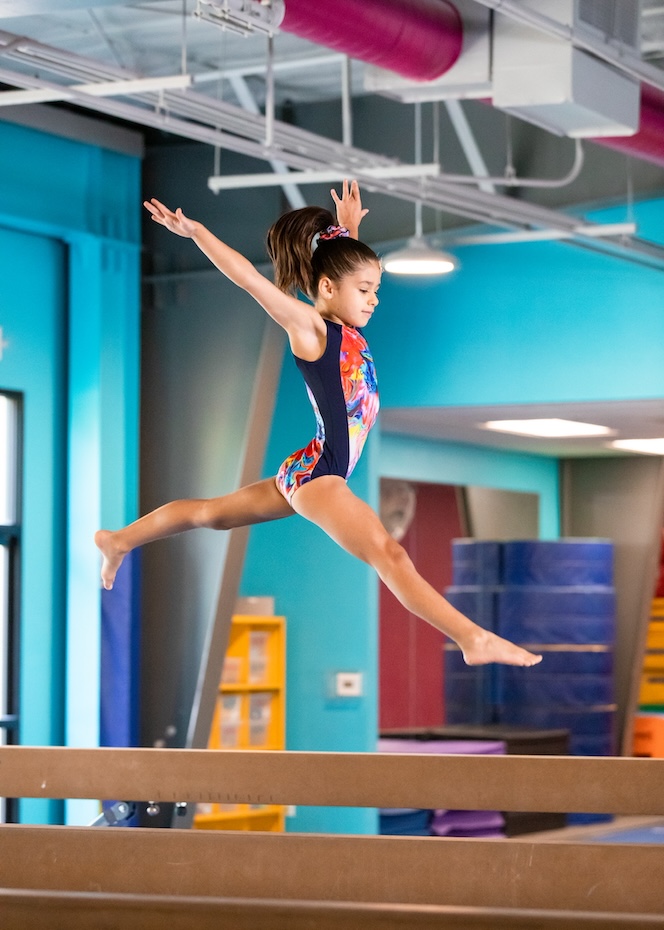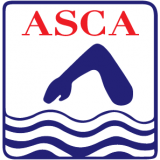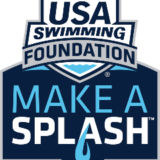
Gymnastics class is about more than epic flips and twists (though sometimes it can be about that, too) or showing off incredible skills.
Gymnastics is about having fun – and building strength, flexibility, and dedication along the way.
If your kiddo lives for the part of their day when they can challenge themselves on the beam, the tumbling floor, or a leap into the trusty foam pit, you can help support their passion and encourage them to improve healthily.
How to Help Your Child Succeed in Gymnastics
Like any sport, success in gymnastics comes from consistent practice, dedication, and the right mindset.
As a parent, you play a role in helping your child manage the highs and lows of the sport. Here are some of the best ways to support your child in gymnastics.
Encourage a Positive Mindset
One of the best ways to support your child is by fostering a growth mindset. Gymnastics can be tricky; children may get frustrated if they don’t master skills quickly.
Instill in them that progress is one day at a time and that every step forward is already a win. Celebrate their small wins, whether that means learning a new move or boosting their balance.
Set Realistic Goals
Help your child set realistic goals based on their skills and the timeframe they’re focused on. This prevents feelings of discouragement when goals aren’t achieved overnight.
Work with their coach to understand realistic progress and set short-term goals that build toward long-term accomplishments.
Be Their Biggest Cheerleader
Always be supportive, no matter how they perform.
Gymnastics can be nerve-wracking, especially during competitions. Show them you’re proud of their effort, regardless of the outcome, and they’ll be more likely to stay motivated and enjoy the sport.
Listen and Provide Emotional Support
Gymnastics is demanding, and your child may face obstacles like a fear of specific skills or the frustration of plateauing.
Encourage open conversations about how they’re feeling. Providing a listening ear for their worries – without pushing them too hard – will help them feel more validated and understood.
Promote a Healthy Balance
Gymnastics is fun and challenging, and before you know it, the sport could be taking up too much of your child’s day-to-day life. It’s essential to ensure your child’s routine stays balanced.
Foster their interests in other hobbies, time with friends, and schoolwork. A healthy balance helps stave off burnout and keeps the sport feeling fun.
How to Help a Child Practice Gymnastics at Home
Most of your child’s gymnastics training will take place at the gym, but sometimes practicing at home can give them a leg up.
Home practice can help refine skills and keep kids engaged with the sport. However, you’ll need to create a safe and supportive environment for practice.
Designate a Safe Space
Create a safe practice area where your child can practice their basic moves, like handstands, cartwheels, and flexibility skills. Keep the area obstacle-free and use appropriate mats to reduce injury risks.
Focus on Conditioning and Flexibility
Encourage your young gymnast to practice conditioning drills like planks, push-ups, and squats, as this will help them build the strength they’ll need for more advanced gymnastics moves down the line.
Stretching exercises are also key to improving flexibility and preventing injuries.
Work on Basics
Instead of focusing on complicated new skills, help your child practice the basics they’ve already learned in class.
Becoming an expert on the basics will give them a solid foundation and build their confidence and readiness for trying new skills.
Be Supportive, Not Pushy
Encourage kids to practice at home, but don’t push them too hard. Keep practice fun and low-pressure. Let your child guide how much and what they want to work on, and praise them for their efforts.
What Is the Best Age to Start Gymnastics for Kids?
The great news is that gymnastics can start early, and the best time to start depends on your child’s own unique interests and physical development.
Here at American Kids in Motion, we start Parent and Child Gymnastics as early as your child’s ability to walk!
Preschool Gymnastics (Ages 3-5)
Preschool gymnastics classes are about developing coordination, balance, and motor skills in a play-based setting.
At this age, class is about building fundamental movement patterns instead of advanced skills. It’s a great way to introduce your child to the sport in a relaxed atmosphere.
Beginner Gymnastics (Ages 5-7)
Around age 5, kids may start learning more structured skills and progressions. This is a great age range to start formal gymnastics training, because kids’ attention spans and coordination are more developed.
Beginner classes tend to cover basics like rolls, handstands, and jumps.
Competitive Training (Ages 7+)
By the age of 7 or 8, kids who show strong interest and skills in gymnastics may begin training for competitions. This level of training takes more time and commitment, but it’s important to let your child advance their skills at their own pace. Pushing them into competition too early can cause them to burn out.
At the end of the day, the best age to start gymnastics depends on your own kids’ individual readiness and enthusiasm. Starting too young with high-pressure training isn’t necessary, but introducing them to the basics early on can foster a love for gymnastics.
Is It Good to Put Your Kids in Gymnastics?
Gymnastics offers numerous benefits for children, both physically and mentally. It can be an excellent activity to help your child grow and develop important life skills.
Physical Benefits
Gymnastics benefits kids’ strength, flexibility, balance, and coordination. It also promotes overall physical fitness, which can benefit your child’s health and well-being.
Mental Benefits
The mental discipline required in gymnastics teaches children focus, determination, and resilience. They learn to set goals, face challenges, and overcome fears, all of which can be applied to other areas of life.
Confidence Building
Successfully mastering gymnastics skills, even simple ones, can be a huge confidence booster for kids. The sense of accomplishment they feel after learning a new move can translate into greater self-esteem in and out of the gym.
Social Skills
Gymnastics classes provide an excellent opportunity for children to make new friends and learn how to work with others. They’ll learn to listen to coaches, take turns, and offer support to their peers, all of which help develop social and communication skills.
Fun
Most importantly, gymnastics is fun! For many kids, the thrill of tumbling, swinging, and jumping is incredibly enjoyable, and this excitement keeps them engaged and active.
Supporting your child in gymnastics involves much more than just attending their classes and competitions. You can play an active role in their improvement as a gymnast by fostering a positive mindset, helping them set goals, and encouraging practice at home.
With the right encouragement, your kiddo can thrive both in the gym and in life.
Gymnastics Classes In Fresno, CA
At America’s Kids In Motion, we offer gymnastics classes for kids of all ages and skills, including a USAG competitive gymnastic program. From beginner recreational skill-building classes for early childhood to advanced specialized training for teens, we have experienced coaches to meet every gymnast where they are.
Contact us today to learn more about our gymnastics classes.




